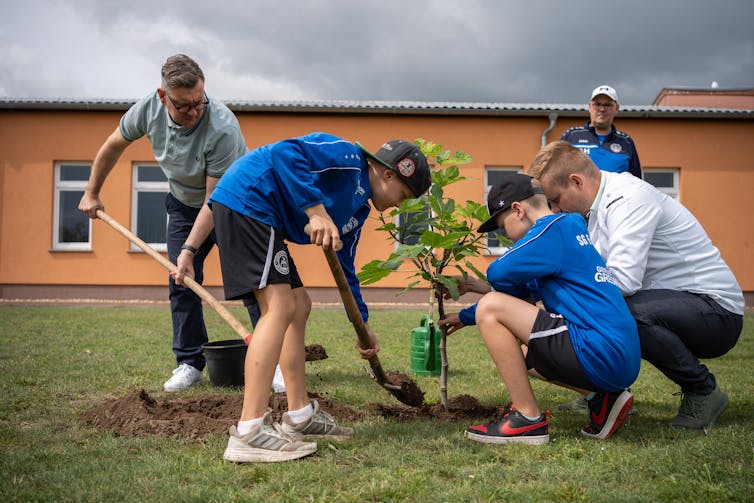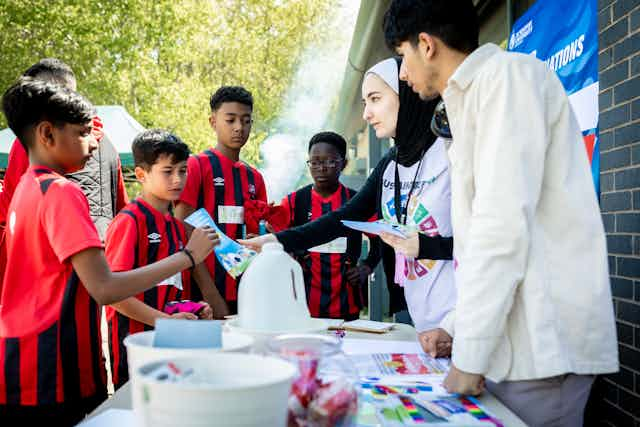Germany and England might be bitter rivals when it comes international football – but some of their amateur clubs have found common ground leading the charge to tackle climate change in sport.
I’m investigating the sustainability tactics of grassroots teams including Leicester Nirvana, Germany’s Eintracht Peitz and International Berlin. As well as sharing expertise with a global network of amateur clubs, the Net Zero Football Project I’m working on at De Montfort University is researching how best to enable coaches, players and their families to play a blinder for the planet. This will develop into a blueprint for teams wanting to transform a game which both contributes to, and is impacted by climate change.
Often, clubs are at the forefront of environmental impacts. A women’s club in the Gambia, Yakaar Academy, is feeling the effects of a changing planet as extreme weather impacts agricultural production, the economy and health in the country.
Leicester Nirvana’s pitch was submerged in the recent UK floods, meaning football was cancelled for weeks leaving the kids of Highfields estate, one of the poorest postcodes in the country, with little to do. And clubs in Germany are busy offering solace from the backlash of a stifling economy, the cost of living crisis and growth of the far-right populists and climate change deniers – the Alternative for Germany (AfD) – amidst plans for a green energy transition.
Football clubs have the potential to bring people together to tackle the climate crisis collectively and Green Football Weekend (3-5 February) is a time to kick off with eight simple ways improve your club’s sustainability credentials.
1. Recruit a captain
Appoint a volunteer sustainability officer to oversee the club’s plans. They can create a sustainability checklist of things to do after matches and training like turning off the lights and taps, or putting the recycling out. Ideally, this person should report to a sustainability committee that involves managers and players. Leicester Nirvana has its own UN Sustainable Development Goal champion, Ivan Liburd. As coach and part of the management team, he finds ways to promote climate action amongst players, tackle racism and violence in the community while ensuring the clubhouse lights are switched off when he goes home.

2. Buy in bulk
Make simple switches and show others how to protect the planet and save money. Buy recycled toilet paper, install LED lightbulbs that are more energy-efficient than conventional bulbs and wash team kits with biodegradable washing powder. Harness the club’s buying power to make sustainability demands on suppliers. At International Berlin, kit companies must meet certain criteria if they want to tender to supply their squads. As a big club, that can mean substantial business for the right sportswear brand if they commit to the necessary changes.
3. Park the bus
In recent emissions tests done at Leicester Nirvana, we found team and fan travel to be the one of the largest contributors to the club’s total greenhouse gas emissions. Where possible use a minibus or share cars to cut costs and reduce emissions when heading to training or games. Eintracht Peitz invested in a minibus for its team with club logos and sponsors emblazened on the side, so it’s hard to miss on match days.
4. Put more plants on plates
Reducing meat and dairy consumption cuts carbon footprints massively. Encourage players to go vegan whenever possible. Buy local produce where you can, but be mindful it’s important to consider what you eat rather than just where it is from. Install a compost bin for food waste. Many drinks sold at amateur football games are unhealthy and come in plastic bottles. Follow the lead of Leicester Nirvana and encourage the use of reusable bottles for all players.

5. Green your club
When a player joins Eintracht Peitz, they’re handed a spade and invited to plant a tree as part of their growing with the club programme. While most urban green spaces are not managed with nature in mind, lots of towns and cities make space for nature in innovative ways. Enhancing biodiversity within the club grounds is a big win. By rewilding some of the green spaces beside the pitch, unused corners and verges can become a haven for wildlife.
6. Communicate creatively about climate
Lots of work needs to be done to educate, inspire and empower players through environmental action. Media messaging and discourse can create feelings of eco-anxiety and helplessness. Use resources from environmental charity Climate Outreach to get positive messages across in creative ways. Encourage coaches and players to sign up to Carbon Literacy training or take part in a fun Climate Fresk workshop. Birmingham County Football Association offers carbon literacy sessions for its local clubs.
7. Shout about your success
Lead by example and show others that there are alternative ways to run a football club. Encourage players to be advocates for the planet. Share what you are doing through social media and invite the local press to cover your stories.
8. Goals win games
Set clear targets for the coming season. To find inspiration and access free resources that outline key goals, join sustainable sports networks, such as the UN Football for the Goals, Pledgeball and De Montfort University’s Net Zero Football Project.

Don’t have time to read about climate change as much as you’d like?
Get a weekly roundup in your inbox instead. Every Wednesday, The Conversation’s environment editor writes Imagine, a short email that goes a little deeper into just one climate issue. Join the 30,000+ readers who’ve subscribed so far.

